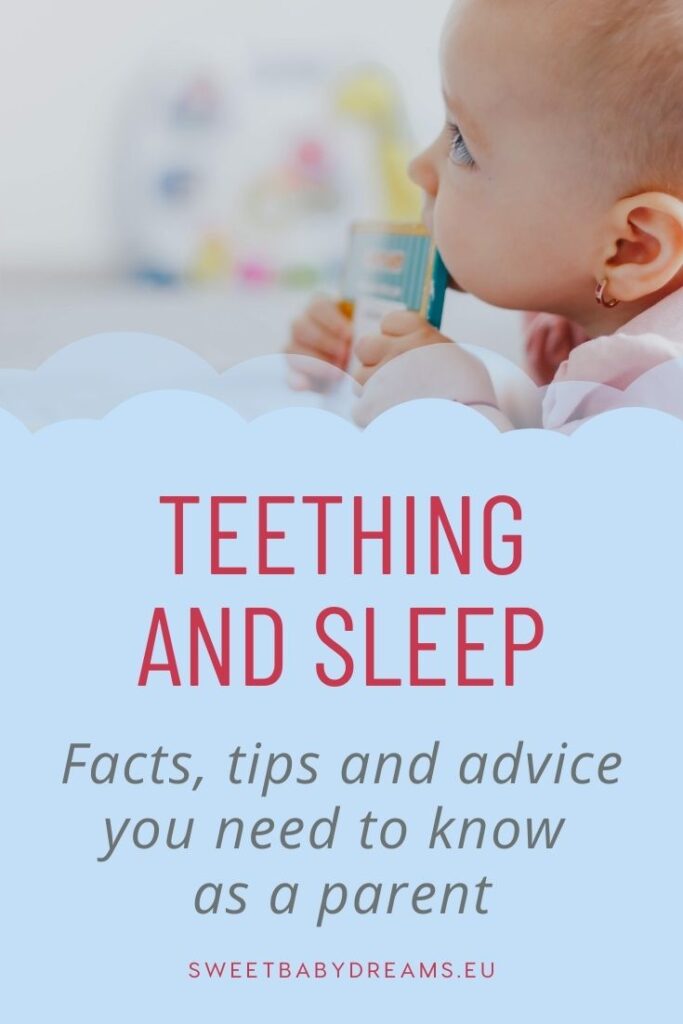Lately, lots of clients have told me that they feel their baby is teething and that it’s making night sleep worse – often for weeks or months on end! While those sharp little baby teeth cutting through gums is bound to be uncomfortable, and sometimes downright sore, is teething really the sleep-culprit it’s made out to be? Let’s look at some facts about teething and sleep that will hopefully help you manage those phases without losing too much sleep.
3 Reasons teething isn’t as disruptive to our little one’s sleep as we think
Reason #1: Blood pressure decreases in the night
Our blood pressure decreases in the night. This actually decreases pain! So if your little one is generally fine during the day, but waking up screaming during the night, chances are it’s not teething!
Reason #2: Gums make way for the teeth
If your little one already has a few little white buds popping out, you’ll notice that most of the time the gums don’t bleed very much when the teeth come through. This is because the gums actually move to make way for the teeth to come through. So while there is some discomfort and pressure involved, it is unlikely that teething causes excruciating and long-term pain in the gums.
Reason #3: The symptoms for teething might be something else entirely!
Classic symptoms of teething are irritability, drooling (and potentially a rash due to the excessive saliva around the mouth), chewing on objects, decreased appetite, swollen gums, or perhaps a low-grade fever. However, this could also be symptoms of another cold or infection! Usually when these symptoms present with teething it has been found that the symptoms only last for a few days only – a couple of days before the teeth erupt from the gum, and a couple of days afterwards. Various studies have shown that diarrhea, vomiting, prolonged fussiness, body rashes and high fever are NOT symptoms of teething.
Babies will teeth multiple times between the ages of 4-24 months, and thus “teething” is frequently seen as a cause of bad sleep habits. A good rule of thumb is that if your baby’s sleep issues go on for longer than about 2 weeks, most likely the culprit is NOT teething but something else. Like what, you ask?
Consider overtiredness
Frequent waking in the night and excessive fussiness throughout the day are actually typical signs of overtiredness! Not getting enough sleep stimulates the production of baby’s stress hormones which work to keep baby awake and “fight” against the sleep hormones. This can often lead to: short catnaps during the day, difficulty settling for naps and at bedtime, frequent night waking with crying, and early morning waking (all things that are often attributed to teething pain!!)
Thinking that your baby may be suffering from teething pain may actually disrupt your child’s sleep more than the actual thing! Obviously, if parents think their child is in excruciating pain they will respond more quickly. However, your baby might just be calling out in their sleep between their sleep cycles, which would be biologically normal and completely harmless. Going in might actually wake them up and disrupt their sleep more!

Practical tips for dealing with teething
If you think your child is really teething:
- Chewing on a cold hard chew toy or washcloth can ease the discomfort
- Rub your babies gums with a clean finger to alleviate the pressure
- Dry their drool, so that they don’t develop secondary painful rashes around their mouth
- Use medication, as approved by your pediatrician
- Try not to start new sleep habits that you don’t want to maintain post teething (such as bringing baby into your bed to sleep when they previously slept in their own crib)
- Re-establish good sleep habits as soon as possible once the tooth has cut through, because the longer you wait, the harder it will be to get back to your old routine
Is it really teething that’s disrupting your child’s sleep?
If your child’s symptoms have gone on for more than 2 weeks and there is still no sign of a tooth:
- Consider adjusting your babies day routine to help them get more sleep and avoid overtiredness
- Address any sleep associations that might be hindering your little one from connecting their sleep cycles at night or at nap-time
- Make your baby’s sleep environment as sleep-friendly as possible
- Ensure that your baby is getting adequate nutrition during the day to minimise the need for night feedings
- Take baby in for a check-up to make sure there is not another underlying infection that might be causing pain
While teething can cause a short-term regression in your baby’s sleep, it’s not the culprit for prolonged sleep problems. So, if you’re little one has been struggling with sleep for more than 2 weeks, book a consult with us to see how we can help both you and your child get the sleep you need.
